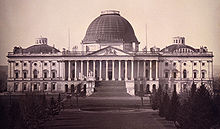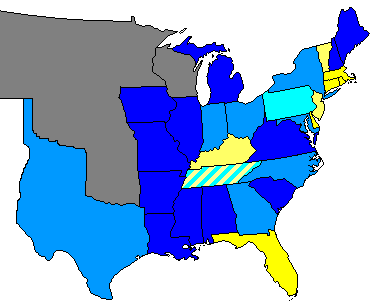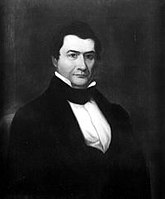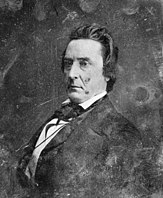29th United States Congress
This article includes a list of references, related reading or external links, but its sources remain unclear because it lacks inline citations. (February 2013) |
| 29th United States Congress | |
|---|---|
28th ← → 30th | |
 United States Capitol (1846) | |
March 4, 1845 – March 4, 1847 | |
| Members | 58 senators 228 representatives 2 non-voting delegates |
| Senate Majority | Democratic |
| Senate President | George M. Dallas (D) |
| House Majority | Democratic |
| House Speaker | John W. Davis (D) |
| Sessions | |
| 1st: December 1, 1845 – August 10, 1846 2nd: December 7, 1846 – March 3, 1847 Special: March 4, 1845 – March 20, 1845 | |
The 29th United States Congress was a meeting of the legislative branch of the United States federal government, consisting of the United States Senate and the United States House of Representatives. It met in Washington, D.C. from March 4, 1845, to March 4, 1847, during the first two years of James Polk's presidency. The apportionment of seats in the House of Representatives was based on the Sixth Census of the United States in 1840. Both chambers had a Democratic majority.
Major events[]
- March 4, 1845: James K. Polk became President of the United States
- October 10, 1845: The (later renamed the United States Naval Academy) opened in Annapolis, Maryland
- December 2, 1845: President Polk announced to Congress that the Monroe Doctrine should be strictly enforced and that the United States should aggressively expand into the West.
- April 25, 1846: Open conflict over border disputes of Texas's boundaries began the Mexican–American War
Major legislation[]
- May 13, 1846: Mexican–American War declared, ch. 16, 9 Stat. 9
- July 9, 1846: District of Columbia retrocession, ch. 35, 9 Stat. 35
- July 30, 1846: Walker tariff, ch. 74, 9 Stat. 42
Treaties[]
- June 15, 1846: Oregon Treaty established the 49th parallel as the border between the United States and Canada, from the Rocky Mountains to the Strait of Juan de Fuca
- January 13, 1847: Treaty of Cahuenga ended the fighting in the Mexican–American War in California (not a formal treaty between nations but an informal agreement between rival military forces)
States admitted[]
- December 29, 1845: Texas admitted as the 28th state
- December 28, 1846: Iowa admitted as the 29th state
Party summary[]
Senate[]
During this congress, two Senate seats were added for each of the new states of Texas and Iowa.
| Party (shading shows control) |
Total | Vacant | ||||
|---|---|---|---|---|---|---|
| Democratic (D) |
Liberty (L) | Whig (W) | Other |
|||
| End of previous congress | 23 | 0 | 27 | 1 | 51 | 3 |
| Begin | 26 | 0 | 24 | 0 | 50 | 4 |
| End | 31 | 1 | 56 | 2 | ||
| Final voting share | 55.4% | 1.8% | 42.9% | 0.0% | ||
| Beginning of next congress | 34 | 0 | 20 | 1 | 55 | 3 |
House of Representatives[]
During this congress, two House seats were added for each of the new states of Texas and Iowa.
| Party (shading shows control) |
Total | Vacant | ||||
|---|---|---|---|---|---|---|
| American (A) |
Democratic (D) | Whig (W) | Other |
|||
| End of previous congress | 0 | 141 | 78 | 4 | 223 | 1 |
| Begin | 6 | 137 | 78 | 0 | 221 | 3 |
| End | 142 | 226 | 2 | |||
| Final voting share | 2.7% | 62.8% | 34.5% | 0.0% | ||
| Beginning of next congress | 1 | 107 | 116 | 3 | 227 | 1 |
Leadership[]

George M. Dallas (D)
until March 4, 1845
on December 27, 1845
from August 8, 1846
Senate[]
- President: George M. Dallas (D)
- President pro tempore: Willie P. Mangum (W), until March 4, 1845
- Ambrose Hundley Sevier (D), only on December 27, 1845
- David R. Atchison (D), from August 8, 1846
House of Representatives[]
- Speaker: John W. Davis (D)
Members[]
This list is arranged by chamber, then by state. Senators are listed by class and representatives are listed by district.
Senate[]
Senators were elected by the state legislatures every two years, with one-third beginning new six-year terms with each Congress. Preceding the names in the list below are Senate class numbers, which indicate the cycle of their election. In this Congress, Class 1 meant their term began with this Congress, facing re-election in 1850; Class 2 meant their term ended with this Congress, facing re-election in 1846; and Class 3 meant their term began in the last Congress, facing re-election in 1848.
Alabama[]
Arkansas[]
Connecticut[]
Delaware[]
Florida[]
Georgia[]
Illinois[]
Indiana[]
Iowa[]
Kentucky[]
Louisiana[]
Maine[]
Maryland[]
Massachusetts[]
Michigan[]
|
Mississippi[]
Missouri[]
New Hampshire[]
New Jersey[]
New York[]
North Carolina[]
Ohio[]
Pennsylvania[]
Rhode Island[]
South Carolina[]
Tennessee[]
Texas[]
Vermont[]
Virginia[]
|
 Senators' party membership by state at the opening of the 29th Congress in March 1845. The senators from Florida and Texas were not seated until later in the Congress. 2 Democrats 1 Democrat and 1 Whig 2 Whigs
|
House of Representatives[]
The names of members of the House of Representatives are preceded by their district numbers.
Alabama[]
Arkansas[]
Connecticut[]Delaware[]
Florida[]
Georgia[]
Illinois[]
Indiana[]
Iowa[]
Kentucky[]
Louisiana[]
Maine[]
Maryland[]
Massachusetts[]
Michigan[]
Mississippi[]
Missouri[]
New Hampshire[]
New Jersey[]
|
New York[]
North Carolina[]
Ohio[]
Pennsylvania[]
Rhode Island[]South Carolina[]
Tennessee[]
Texas[]
Vermont[]Virginia[]
Non-voting members[] |
 Speaker John W: Davis 
| ||||||||
Changes in membership[]
The count below reflects changes from the beginning of the first session of this Congress.
Senate[]
- Replacements: 8
- Democrats (D): no net change
- Whigs (W): no net change
- Deaths: 3
- Resignations: 6
- Interim appointments: 1
- Seats of newly admitted states: 4
- Total seats with changes: 14
| State (class) |
Vacated by | Reason for change | Successor | Date of successor's formal installation[a] |
|---|---|---|---|---|
| Florida (1) |
Vacant | Florida admitted to the Union at end of previous congress | David L. Yulee (D) | Elected July 1, 1845 |
| Florida (3) |
Vacant | Florida admitted to the Union at end of previous congress | James Westcott (D) | Elected July 1, 1845 |
| South Carolina (2) |
Vacant | Senator Daniel E. Huger resigned in previous congress. Successor elected November 26, 1845. |
John C. Calhoun (D) | Elected November 26, 1845 |
| Virginia (1) |
Vacant | Failure to elect | Isaac S. Pennybacker (D) | Elected December 3, 1845 |
| Mississippi (2) |
Robert J. Walker (D) | Resigned March 5, 1845, after being appointed U.S. Secretary of the Treasury. Successor appointed November 3, 1845. Appointee was later elected on an unknown date. |
Joseph W. Chalmers (D) | Appointed November 3, 1845 |
| Pennsylvania (3) |
James Buchanan (D) | Resigned March 5, 1845, after being appointed U.S. Secretary of State | Simon Cameron (D) | Elected March 13, 1845 |
| Massachusetts (2) |
Isaac C. Bates (W) | Died March 16, 1845 | John Davis (W) | Elected March 24, 1845 |
| Georgia (2) |
John M. Berrien (W) | Resigned May, 1845 when appointed to the Georgia Supreme Court | John M. Berrien (W) | Elected November 13, 1845 |
| New Hampshire (2) |
Levi Woodbury (D) | Resigned November 20, 1845, to become Associate Justice of the U.S. Supreme Court | Benning W. Jenness (D) | Appointed December 1, 1845 |
| Texas (1) |
Texas admitted to the Union December 29, 1845, and remained vacant until February 21, 1846 | Thomas J. Rusk (D) | Elected February 21, 1846 | |
| Texas (2) |
Texas admitted to the Union December 29, 1845, and remained vacant until February 21, 1846 | Sam Houston (D) | Elected February 21, 1846 | |
| New Hampshire (2) |
Benning W. Jenness (D) | Lost election to finish the term. Winner elected June 13, 1846. |
Joseph Cilley (L) | Elected June 13, 1846 |
| North Carolina (3) |
William H. Haywood Jr. (D) | Resigned July 25, 1846, after having refused to be instructed by the North Carolina state legislature on a tariff question | George E. Badger (W) | Elected November 25, 1846 |
| South Carolina (3) |
George McDuffie (D) | Resigned August 17, 1846. Successor appointed December 4, 1846, and subsequently elected to finish the term. |
Andrew Butler (D) | Seated December 4, 1846 |
| Iowa (2) |
Iowa admitted to the Union December 28, 1846 | Vacant | Not filled this term | |
| Iowa (3) |
Iowa admitted to the Union December 28, 1846 | Vacant | Not filled this term | |
| Louisiana (2) |
Alexander Barrow (W) | Died December 29, 1846 | Pierre Soulé (D) | Elected January 21, 1847 |
| Virginia (1) |
Isaac S. Pennybacker (D) | Died January 12, 1847 | James M. Mason (D) | Elected January 21, 1847 |
House of Representatives[]
- Replacements: 12
- Democrats (D): 1 seat net gain
- Whigs (W): 1 seat net loss
- Deaths: 5
- Resignations: 6
- Contested election: 1
- Seats of newly admitted states: 4
- Total seats with changes: 17
| District | Vacated by | Reason for change | Successor | Date of successor's formal installation[a] |
|---|---|---|---|---|
| Florida At-large | Vacant | Florida admitted to the Union at end of previous congress | Edward C. Cabell (W) | Seated October 6, 1845 |
| Georgia 3rd | Vacant | Rep-elect Washington Poe declined the seat | George W. Towns (D) | Seated January 5, 1846 |
| Texas 1st | Texas admitted into the Union December 29, 1845, and seat remained vacant until March 30, 1846 | David S. Kaufman (D) | Seated March 30, 1846 | |
| Texas 2nd | Texas admitted into the Union December 29, 1845, and seat remained vacant until March 30, 1846 | Timothy Pilsbury (D) | Seated March 30, 1846 | |
| New Jersey 2nd | Samuel G. Wright (W) | Died July 30, 1845 | George Sykes (D) | Seated November 4, 1845 |
| Louisiana 1st | John Slidell (D) | Resigned November 10, 1845, after being appointed Minister to Mexico, but government refused to accept him | Emile La Sére (D) | Seated January 29, 1846 |
| Tennessee 8th | Joseph H. Peyton (W) | Died November 11, 1845 | Edwin H. Ewing (W) | Seated January 2, 1846 |
| Virginia 11th | William Taylor (D) | Died January 17, 1846 | James McDowell (D) | Seated March 6, 1846 |
| Florida At-large | Edward C. Cabell (W) | Lost contested election January 24, 1846 | William H. Brockenbrough (D) | Seated January 24, 1846 |
| Mississippi At-large | Jefferson Davis (D) | Resigned some time in June, 1846 in order to take part in the Mexican War | Henry T. Ellett (D) | Seated January 26, 1847 |
| New York 12th | Richard P. Herrick (W) | Died June 20, 1846 | Thomas C. Ripley (W) | Seated December 17, 1846 |
| Arkansas At-large | Archibald Yell (D) | Resigned July 1, 1846, in order to take part in the Mexican War | Thomas W. Newton (W) | Seated February 6, 1847 |
| Missouri At-large | Sterling Price (D) | Resigned August 12, 1846, in order to take part in the Mexican War | William McDaniel (D) | Seated December 7, 1846 |
| Alabama 3rd | William L. Yancey (D) | Resigned September 1, 1846 | James L. Cottrell (D) | Seated December 7, 1846 |
| Alabama 7th | Felix G. McConnell (D) | Died September 10, 1846 | Franklin W. Bowdon (D) | Seated December 7, 1846 |
| Iowa Territory At-large | Augustus C. Dodge (D) | Territory was dissolved after Iowa was admitted to the Union December 28, 1846 | ||
| Iowa At-large | Iowa admitted into the Union December 28, 1846 | S. Clinton Hastings (D) | Seated December 28, 1846 | |
| Iowa At-large | Iowa admitted into the Union December 28, 1846 | Shepherd Leffler (D) | Seated December 28, 1846 | |
| Illinois 7th | Edward D. Baker (W) | Resigned January 15, 1847, in order to take part in the Mexican War | John Henry (W) | Seated February 5, 1847 |
| Illinois 5th | Stephen A. Douglas (D) | Resigned March 3, 1847, at close of congress after being elected to the US Senate | Vacant | Not filled this term |
Committees[]
Lists of committees and their party leaders.
Senate[]
- Agriculture (Chairman: Daniel Sturgeon)
- Audit and Control the Contingent Expenses of the Senate (Chairman: Jesse Speight)
- (Select)
- Claims (Chairman: Isaac S. Pennybacker)
- Commerce (Chairman: William Haywood then John Adams Dix)
- (Select)
- District of Columbia (Chairman: William Haywood then Simon Cameron)
- Finance (Chairman: John C. Calhoun then Dixon H. Lewis)
- Foreign Relations (Chairman: William Allen then Ambrose H. Sevier)
- (Select) (Chairman: Daniel Webster)
- Indian Affairs (Chairman: Ambrose H. Sevier then Arthur P. Bagby)
- (Select) (Chairman: Lewis Cass)
- Judiciary (Chairman: Chester Ashley)
- Manufactures (Chairman: Daniel S. Dickinson)
- (Select)
- (Select) (Chairman: John C. Calhoun)
- Military Affairs (Chairman: Thomas H. Benton)
- Militia (Chairman: David R. Atchison)
- Naval Affairs (Chairman: John Fairfield)
- (Select)
- Patents and the Patent Office (Chairman: Simon Cameron then Walter Colquitt)
- Pensions (Chairman: Henry Johnson)
- Post Office and Post Roads (Chairman: John M. Niles)
- Printing (Chairman: Charles G. Atherton)
- Private Land Claims (Chairman: David Levy Yulee)
- Public Buildings and Grounds (Chairman: Simon Cameron)
- Public Lands (Chairman: Sidney Breese)
- (Chairman: Dixon H. Lewis)
- Revolutionary Claims (Chairman: Thomas Clayton)
- (Chairman: Edward A. Hannegan)
- Tariff Regulation (Select)
- Territories (Chairman: James Westcott)
- (Select) (Chairman: John Adams Dix)
- Whole
House of Representatives[]
- Accounts (Chairman: Daniel P. King)
- Agriculture (Chairman: Joseph H. Anderson)
- Claims (Chairman: John Reeves Jones Daniel)
- Commerce (Chairman: Robert McClelland)
- District of Columbia (Chairman: Robert M.T. Hunter)
- Elections (Chairman: Hannibal Hamlin)
- Engraving (Chairman: Jacob S. Yost)
- Expenditures in the Navy Department (Chairman: John F. Collin)
- Expenditures in the Post Office Department (Chairman: John H. Harmanson)
- Expenditures in the State Department (Chairman: Stephen Strong)
- Expenditures in the Treasury Department (Chairman: John F. Scammon)
- Expenditures in the War Department (Chairman: Owen D. Leib)
- Expenditures on Public Buildings (Chairman: Orlando B. Ficklin)
- Foreign Affairs (Chairman: Charles J. Ingersoll)
- Indian Affairs (Chairman: John A. McClernand)
- Invalid Pensions (Chairman: Preston King)
- Judiciary (Chairman: George O. Rathbun)
- Manufactures (Chairman: John Quincy Adams)
- Mileage (Chairman: John P. Martin)
- Military Affairs (Chairman: Hugh A. Haralson)
- Militia (Chairman: James A. Black)
- Naval Affairs (Chairman: Isaac E. Holmes)
- Patents (Chairman: Thomas J. Henley)
- Post Office and Post Roads (Chairman: George W. Hopkins)
- Private Land Claims (Chairman: James B. Bowlin)
- Public Buildings and Grounds (Chairman: Orlando B. Ficklin)
- Public Expenditures (Chairman: Robert P. Dunlap)
- Public Lands (Chairman: John A. McClernand)
- Revisal and Unfinished Business (Chairman: Cullen Sawtelle)
- Revolutionary Claims (Chairman: Joseph Johnson)
- Revolutionary Pensions (Chairman: Richard Brodhead)
- Roads and Canals (Chairman: Robert Smith)
- Rules (Select)
- Standards of Official Conduct
- Territories (Chairman: Stephen A. Douglas)
- Ways and Means (Chairman: James I. McKay)
- Whole
Joint committees[]
- Enrolled Bills (Chairman: Sen. Jesse D. Bright)
- The Library (Chairman: N/A)
- Printing (Chairman: N/A)
Employees[]
- Librarian of Congress: John Silva Meehan
Senate[]
- Chaplain: Septimus Tustin (Presbyterian), until December 16, 1846
- Henry Slicer (Methodist), elected December 16, 1846
- Secretary: Asbury Dickins
- Sergeant at Arms: Edward Dyer, died September 8, 1845
- , elected December 9, 1845
House of Representatives[]
- Chaplain: William H. Milburn (Methodist), elected December 3, 1845
- (Presbyterian), elected December 7, 1846
- Clerk: Benjamin B. French
- Doorkeeper: , elected December 3, 1845
- Postmaster:
- Reading Clerks:[data unknown/missing]
- Sergeant at Arms:
See also[]
- 1844 United States elections (elections leading to this Congress)
- 1844 United States presidential election
- 1844 and 1845 United States Senate elections
- 1844 and 1845 United States House of Representatives elections
- 1846 United States elections (elections during this Congress, leading to the next Congress)
- 1846 and 1847 United States Senate elections
- 1846 and 1847 United States House of Representatives elections
Notes[]
References[]
- Martis, Kenneth C. (1989). The Historical Atlas of Political Parties in the United States Congress. New York: Macmillan Publishing Company.
- Martis, Kenneth C. (1982). The Historical Atlas of United States Congressional Districts. New York: Macmillan Publishing Company.
External links[]
- Statutes at Large, 1789–1875
- Senate Journal, First Forty-three Sessions of Congress
- House Journal, First Forty-three Sessions of Congress
- Biographical Directory of the U.S. Congress
- U.S. House of Representatives: House History
- U.S. Senate: Statistics and Lists
- Congressional Directory for the 29th Congress, 1st Session.
- Congress, United States (1846). Congressional Directory for the 29th Congress, 1st Session (Revision).
- Congressional Directory for the 29th Congress, 2nd Session.
- 29th United States Congress


